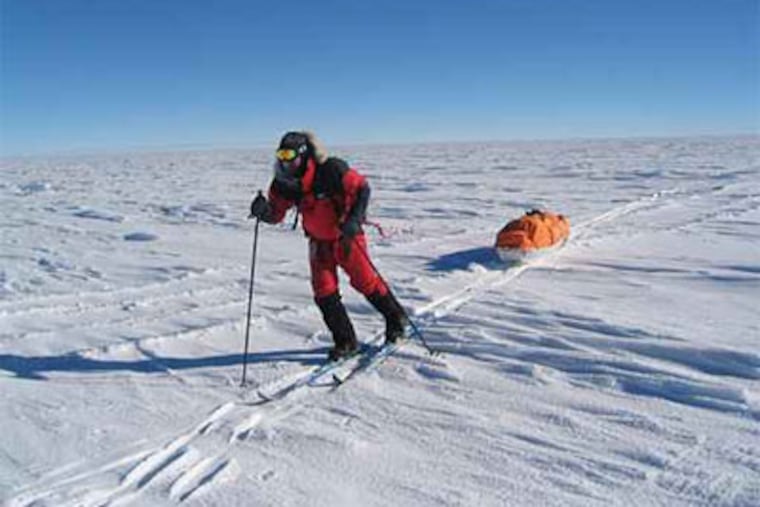Local man reaches South Pole
Gladwyne businessman Todd Carmichael has become the first American to cross Antarctica to the South Pole - alone, on foot and without support, according to his support team in the United States.

Gladwyne businessman Todd Carmichael has become the first American to cross Antarctica to the South Pole - alone, on foot and without support, according to his support team in the United States.
In his journey of 39 days, Carmichael, 45, also became one of only a handful of people to complete the more than 700-mile trek solo, slogging more than 18 miles a day across the Earth's most unforgiving terrain, climbing from sea level to nearly 10,000 feet.
He arrived at Amundsen-Scott South Pole Station at 4:10 p.m. EST today - 97 years and one week after polar explorer Roald Amundsen first claimed the achievement.
The Norwegian led an exploration party of five people and nearly a dozen dogs, but the co-owner of La Colombe Torrefaction coffee company pulled only a sled containing his tent and food - and a satellite phone and tracking beacons. And while Amundsen had to walk back, Carmichael will be flown back to the edge of the continent by a supply plane.
Carmichael's brother-in-law, Brian Hart, said he received a call from the trekker's support team about 7 p.m. today announcing Carmichael's arrival at the pole.
On Nov. 12, Carmichael pushed off from Hercules Inlet at 80 degrees south latitude, the usual starting point for such Antarctic expeditions. Carmichael is challenging the record of 39 days, 9 hours and 33 minutes set by Hannah McKeand of Britain in 2006. Yesterday, Carmichael's support team was unsure of his start time; he appeared to have finished within one hour of McKeand's time.
Along the way, Carmichael set out to do scientific reporting on global warming. Among his sponsors are Kennedy Health Systems and the Geographical Society of Philadelphia. In June, the society awarded him its 2008 Exploration Grant.
Carmichael, who sent text and audio dispatches to supporters following him on the Internet, largely depleted his cache of food as he trudged through the 24-hour sunlight of the Antarctic summer, with temperatures reaching 35 degrees below zero. After his ski bindings snapped, first on the second and again on the eighth day, he ditched the skis entirely on Day 9.
His dispatches described a wilderness of frozen nothingness. On Thanksgiving, on which his dinner was macaroni and cheese, chili macaroni with beef and beef stew, he told of "complete whiteout and fields of sastrugi" - large ridges of wind-blown snow and ice. He likened making forward progress to "fighting your way through a junkyard that is 20 miles long . . . blindfolded."
He described the snow, which he melted on a stove, as a combination of "talcum powder, moon dust and laundry detergent."
On the last few days, though, his mood lifted. On Thursday, Hart reported on Carmichael's blog, SubZeroSolo.com, that Carmichael had decided to stop fighting.
"He says it was like an epiphany . . . just march ahead, slow and steady, no matter how long it takes," wrote Hart, whose sister is singer-songwriter Lauren Hart, Carmichael's wife.
"Just as importantly, he reminded himself again to enjoy the journey. As grueling as this expedition has been, I know he will always miss these days alone on the ice. It's good to know he will be appreciating it until the very end."
Last year, Carmichael attempted an unassisted trek with a partner, Jason De Carteret, who injured a leg early on and had to quit. Carmichael gave up after 24 days. He had lost a few toenails and 25 pounds. In 2004, he did a 100-mile test trek.
Carmichael, who trained by dragging weighted tractor tires on roller skis along Conshohocken State Road, left Philadelphia on Nov. 2. After a stop in southern Chile to secure his 250-pound load, a pilot took him to 80°S/80°W.
Why do it? That's "a difficult answer," he said during an interview in late October. "I do it because I love it." He said he would pay for the trek ($70,000) himself. Income from sponsors will go to charities, including Orangutan Foundation International, a project that he and Lauren Hart support.